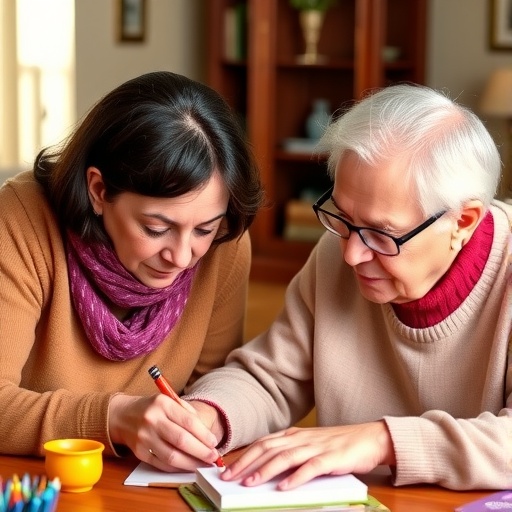In recent years, the significance of intergenerational learning has started to emerge more prominently in educational discussions. A groundbreaking study titled “Intergenerational Learning across Home and School: Making Visible the Role of Grandparents,” conducted by researchers Crummy, Sainz, and Moore, sheds light on the vital role that grandparents play in the educational journey of their grandchildren. This research not only underscores the importance of familial connections but also highlights the unique skills and wisdom that older generations can impart to younger ones.
The researchers embarked on this inquiry against a backdrop of increasing recognition of the family’s role in education. With the rise of nuclear families and the traditional family structures evolving, grandparents often emerge as pivotal figures in children’s lives, especially in their formative years. The implications of these relationships extend beyond emotional support; they hold educational benefits that can significantly influence children’s growth and development.
One of the central hypotheses of the study is that grandparents contribute a wealth of experiential knowledge that can enhance the learning process at home as well as in school settings. This study draws on qualitative interviews with both grandparents and their grandchildren to explore personal stories that illustrate how these intergenerational exchanges manifest in daily life. From storytelling sessions rich with historical accounts to hands-on activities that blend traditional skills with contemporary knowledge, the study encapsulates a broad spectrum of learning experiences shared across generations.
In their findings, the research team presented several compelling narratives illustrating how these intergenerational dynamics operate. A notable example includes a grandmother sharing her gardening techniques with her grandson, which not only teaches the child about nature and responsibility but also fosters a deeper emotional bond. Such practical skills, conveyed through familial love, reinforce the idea that learning isn’t confined to the confines of a classroom but is an omnipresent, everyday experience linking generations.
Moreover, the study emphasizes that these connections can also significantly influence cognitive and social development. By engaging in dialogue and sharing experiences with grandparents, children develop critical thinking skills and emotional intelligence. The exchanges often provoke deeper thinking and reflection, which are integral components of a child’s holistic education. Engaging in conversations about historical events or family traditions allows children to contextualize their personal histories within broader societal narratives, fostering a sense of belonging and identity.
The demand for recognition of grandparents as educational stakeholders is paramount. As society shifts toward a greater emphasis on inclusivity and collaborative learning environments, the study advocates for institutional acknowledgment of the invaluable role that grandparents can play. Schools are encouraged to incorporate family engagement strategies that explicitly include grandparents, creating programs that welcome their involvement in the educational framework. This could manifest in various ways, from family days where multi-generational activities are showcased to workshops where grandparents share their expertise.
Interestingly, the research also points to the digital age’s challenges and opportunities regarding intergenerational learning. The increasing reliance on technology has the potential to either alienate or connect grandparents with their grandchildren. While some grandparents may initially struggle with emerging technologies, the same tools can serve as bridges to engage younger family members. For instance, video calls provide opportunities for virtual interactive story times or collaborative projects, thereby facilitating learning and emotional connections across distances.
The implications of this study extend to policymakers and educators as they rethink the roles of family in the educational landscape. Integrating these findings into curriculum design could pave the way for pedagogies that embrace family involvement, making education not solely the responsibility of schools but a collaborative journey that includes critical family figures. By framing education as a collective effort, stakeholders may see offspring benefiting from enriched learning experiences marked by involvement from multiple generations.
Moreover, the research lends credence to community initiatives aimed at strengthening bonds between families. Programs that engage grandparents in mentorship roles can not only foster deeper connections but also stimulate community cohesion. As grandparents contribute their time and knowledge, they also forge networks of support that can resonate throughout neighborhoods, providing children with enriched learning environments steeped in love and community ties.
An important aspect of this study is its acknowledgment of cultural variations in intergenerational relationships. Different communities have multifaceted dynamics that affect how grandparents engage with their grandchildren. Recognizing this diversity is crucial for developing inclusive strategies that respect and integrate the unique cultural narratives within different families. Understanding localized practices allows educators and policymakers to create programs that resonate with the values and traditions of the families they aim to support.
In conclusion, the research conducted by Crummy, Sainz, and Moore serves as a compelling reminder of the power of intergenerational learning. By making the role of grandparents visible in educational contexts, we can foster environments that empower not only individual children but also families and communities as a whole. The study advocates for embracing relationships that transcend generations, enriching the educational experience and nurturing future generations. It ultimately builds a case for a multifaceted education model that recognizes the importance of learning as an intergenerational endeavor, one that is deeply rooted in love, experience, and the collective wisdom drawn from family histories.
As we move forward, it is imperative that educators, policymakers, and communities harness this knowledge to create inclusive and supportive environments where grandchildren and grandparents can learn together, bridging the generational divide and affirming the enduring value of family in education.
Subject of Research: Intergenerational learning and the role of grandparents in education.
Article Title: Intergenerational Learning across Home and School: Making Visible the Role of Grandparents.
Article References:
Crummy, A., Sainz, G.M., Moore, B. et al. Intergenerational Learning across Home and School: Making Visible the Role of Grandparents.
Early Childhood Educ J (2025). https://doi.org/10.1007/s10643-025-01962-3
Image Credits: AI Generated
DOI:
Keywords: Intergenerational Learning, Grandparents, Education, Family Involvement, Holistic Development, Community Engagement, Cultural Diversity, Learning Experiences.




